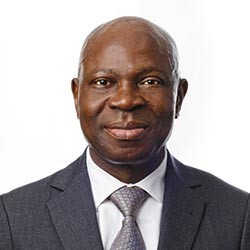Welcoming Remarks by Gilbert Houngbo, President of IFAD, at the Fifth Global Meeting of the Indigenous Peoples’ Forum
IFAD Asset Request Portlet
Asset Publisher
Welcoming Remarks by Gilbert Houngbo, President of IFAD, at the Fifth Global Meeting of the Indigenous Peoples’ Forum
The value of indigenous food systems: Resilience in the context of the COVID-19 pandemic
Location: IFAD headquarters, Rome, Italy
02 February 2021It is my great pleasure to welcome you to the Fifth Global Meeting of the Indigenous Peoples’ Forum at IFAD.
As we cannot meet in person, this virtual welcome is testimony to our mutual determination to continue our dialogue despite the COVID-19 pandemic.
Today is a milestone. It represents ten years since the first meeting of the Forum. This Forum is hosted by IFAD but led by indigenous peoples. It is a formula that I believe works. The perspectives and development approaches of indigenous peoples discussed during the past Forums have enriched IFAD.
We are committed to contributing to a world without poverty, a world without hunger. We know that the only way to achieve this is by joining forces with indigenous peoples – who are stewards both of nature and of a vast reservoir of traditional knowledge around the world.
That knowledge is critical today. Indigenous peoples are recognized and respected as custodians of fragile ecosystems. Eighty per cent of the world’s remaining biodiversity is found in indigenous territories.
Today’s meeting will discuss indigenous food systems, and the resilience they have displayed in the face of COVID-19. I can promise you, IFAD will be listening.
For IFAD, indigenous peoples are key partners in development. We constantly learn from the breadth of your understanding, which reminds us that humans are part of nature, and not apart from nature. You guide us to rethink the way we interact with our earth, and rethink the ways we produce and consume food.
During the preparatory meetings for this Forum, the steering committee worked to make regional consultations more inclusive and to consult more widely, despite the pandemic constraints. More than 540 indigenous representatives took part, along with many IFAD staff.
Throughout regional consultations, we have listened to your proposals and learned about the solutions you have implemented amid the crisis. You have shown how resilience needs to build from the grassroots up, incorporating the best of traditional knowledge and maintaining a connection with nature.
The message is clear: the role of development partners should be to strengthen what is already in place, rather than to build a new set of instruments. We have heard your concerns, too, that indigenous peoples continue to face systematic discrimination and criminalization.
We recognize that working with indigenous peoples requires a commitment to social justice and to leaving no one behind. COVID-19 has devastated the lives of millions across the globe. But this dreadful plague also drives us to find ways to live more harmoniously with nature.
Bringing indigenous knowledge and practices into global food systems can spur new and creative solutions to the challenges we face, especially climate change. And it can help put an end to bad practices that harm indigenous peoples and nature.
There are also lessons for the world in indigenous peoples’ values and cultures: in particular, the systems of solidarity and mutual support that can contribute to a lasting recovery from the pandemic and its effects.
In this spirit of learning, last July IFAD launched a first call for nominations for the Indigenous Peoples Awards. These awards aim to promote best practices of engagement with indigenous peoples. We want to encourage knowledge sharing, and identify opportunities to replicate and scale up results. During this Global Meeting, we will get to know the winners.
We believe that indigenous knowledge, sustainable farming practices, environmental stewardship and the leading role of indigenous women all have a vital place in the 2030 Agenda.
To create solutions adapted to different world views, we must walk side by side with indigenous peoples. Already, we have learned and done much.
Ladies and gentlemen,
As you know, IFAD supports projects that help rural people grow more food, develop skills, build strong organizations and gain a voice in the decisions that affect their lives.
Since the beginning of its operations, IFAD has approved 245 projects targeting at least 42 million indigenous people. Currently, our portfolio includes 63 ongoing projects providing financial support to over 6.7 million indigenous people.
IFAD has also deployed its Indigenous Peoples Assistance Facility (IPAF).The Facility has proven its capacity to foster self-driven development through small grants. So far, 159 projects have been financed in more than 45 countries. Of the 120,000 beneficiaries, half are women.
Ladies and gentlemen,
We are committed to put your ideas to work. Our dialogue over the coming days can make a valuable contribution to the United Nations’ 2021 Food Systems Summit. The Summit’s goal is to help transform our food systems so that we can deliver the 2030 Agenda. IFAD has been designated the U.N. Anchor Agency for Action Track 4 – to advance equitable livelihoods and value distribution.
The ideas and insights you share during the coming days will shape both the direction of our partnership over the next two years and IFAD’s contribution to the Food Systems Summit.
So let us all enjoy this global meeting and celebrate our partnership. And let us work together to ensure indigenous food systems flourish and help guide us to eradicate poverty and hunger.
Thank you.
Not checked against delivery
